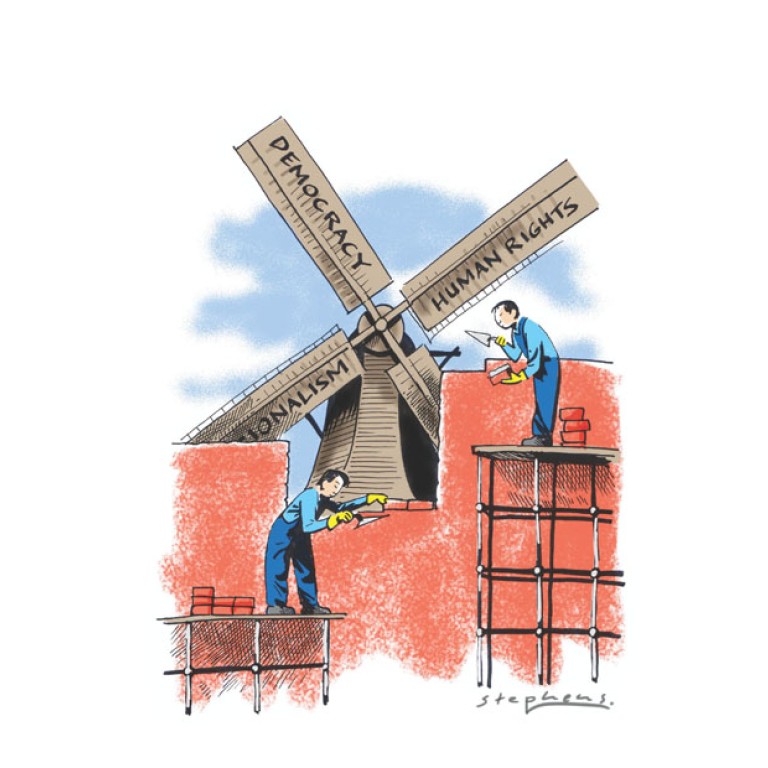
Chinese ideologues' wrong tilt on universal values
Lanxin Xiang says while China is right to cast doubt on the validity of Western-inspired concepts for others, its propaganda machine is wrong to reject the very existence of universal values
Of late in the Chinese media, party ideologues and officials have launched seemingly brave campaigns to reject the existence of any "universal values". It stems from President Xi Jinping's speech at a national conference for propaganda chiefs in August, in which he stressed the need to step up ideological work to maintain Chinese characteristics in development and domestic governance. Xi never mentioned "universal values", but many commentators seem to be interpreting his speech to benefit their own interests.
Clearly, however, such attacks on the very existence of a set of Western-inspired universal values, such as democracy, human rights and constitutionalism, are tilting at windmills.
I drew attention to such ideological issues as early as 2007 in my book, . Since Xi came to power, he has been performing a superb act of balancing various political forces. But launching an ideological campaign against universal values while promoting a "new type of great power relations" would be a contradiction; the latter is clearly aimed at taking ideology out of the fight between China and the US.
Xi may not have meant to attack universal values per se. His aim was, rather, to forestall any attempt at the wholesale Westernisation of China.
Without a true religious legacy, Chinese never ask ontological questions and the Cartesian obsession with defining "what is" finds no natural home in Chinese thought. "Where is the way ()" is about as far as the Chinese ontological inquiry goes. In this sense, universal values have little intuitive appeal to the Chinese. Not surprisingly, this vacuum has been filled, since the anti-tradition May Fourth Movement of 1919, by these Western constructs.
Because Xi considers national restoration at the core of his "China dream", he has to tackle these imported concepts, which are now widely accepted by many in China as well as around the world as "universal values". To achieve this, some serious deconstruction is necessary, with a fresh look at what these key words really mean and how they have come to be so dominant in our political discourse.
A serious inquiry should start with analysis and logic, rather than a wall of denial. After all, many of these concepts have worked well in other cultural contexts.
To be sure, many have fundamental flaws. For example, the core concept in universal human rights, that "all men are created equal", cannot be explained adequately unless one accepts a religion with a creator at its core. Moreover, the political philosophy of a "social contract", despite having originated in the Enlightenment, is fundamentally ahistorical; adherents to the theory are only interested in exploring the limits of an individual's political obligations. Chinese, however, find it almost impossible to understand political theories without even a shred of historical evidence.
Nevertheless, these key words have become powerful analytical tools for explaining different political systems. The "social contract" theory, for example, is supposed to "explain" or help illuminate the transition from a state of nature to a social or political existence. But in Chinese tradition, an individual does not exist in the state of nature, for only a social person, that is, a person with social relations, can qualify as a real individual. A state of nature, in the Chinese thought system, is an animal world where all are pitted against all.
Critically, many of these key words can serve as ideological weapons; they can be used as powerful foreign policy instruments either in discrediting a rival state or imposing more international obligations on a state than it is prepared to meet. It is particularly useful for denying the political legitimacy of "undemocratic" states such as China. Also, contracts create obligations, hence this form of theory can be expanded easily to include the "global citizen" or the "global commons" concept so as to demand new obligations from states, even though there is, in reality, hardly any global sovereign power.
As long as the international system is dominated by Western-generated values and rules, the real power of interpreting political legitimacy, global common goods and international obligations will be vested in the West, rather than in a real contract between the majority of the world's population and a nominal global power such as the United Nations. A social contract can thus be a perfect cover for naked power play in international politics.
From a political perspective, Xi is intuitively right in realising the need for a counter-argument against these Western values disguised as universal values, but he is smart enough not to attack the validity of these values in practice under a different cultural context.
However, the Chinese propaganda machine, living up to its ugly name, has launched an attack at the wrong target. Many commentators focused on the question of whether there are any universal values. By rejecting their existence, they leave little room for further debate.
Above all, this quixotic attack is a sign of bad presentation. Political presentation can enhance or undermine a regime's legitimacy, and China is no exception. And, indeed, such bad political presentation mirrors the comical debate over political reforms. The Chinese elite frequently ask how the system can be reformed. But the debate is often from two extremes: one prefers wholesale Westernisation; the other, no Westernisation at all. A middle-of-the-road approach is non-existent.
Some Western key words have been accepted in the world as universal values, and so the best approach is to accept those we consider to be "commonly shared values", without losing sight of their contingent nature. Having performed so brilliantly in handling the Bo Xilai case, which pleased most parts of society, Xi has no need of such a futile campaign.

